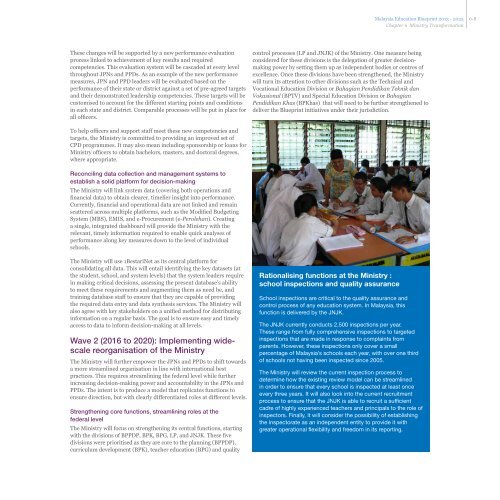Preliminary-Blueprint-Eng
Preliminary-Blueprint-Eng
Preliminary-Blueprint-Eng
Create successful ePaper yourself
Turn your PDF publications into a flip-book with our unique Google optimized e-Paper software.
These changes will be supported by a new performance evaluation<br />
process linked to achievement of key results and required<br />
competencies. This evaluation system will be cascaded at every level<br />
throughout JPNs and PPDs. As an example of the new performance<br />
measures, JPN and PPD leaders will be evaluated based on the<br />
performance of their state or district against a set of pre-agreed targets<br />
and their demonstrated leadership competencies. These targets will be<br />
customised to account for the different starting points and conditions<br />
in each state and district. Comparable processes will be put in place for<br />
all officers.<br />
To help officers and support staff meet these new competencies and<br />
targets, the Ministry is committed to providing an improved set of<br />
CPD programmes. It may also mean including sponsorship or loans for<br />
Ministry officers to obtain bachelors, masters, and doctoral degrees,<br />
where appropriate.<br />
reconciling data collection and management systems to<br />
establish a solid platform for decision-making<br />
The Ministry will link system data (covering both operations and<br />
financial data) to obtain clearer, timelier insight into performance.<br />
Currently, financial and operational data are not linked and remain<br />
scattered across multiple platforms, such as the Modified Budgeting<br />
System (MBS), EMIS, and e-Procurement (e-Perolehan). Creating<br />
a single, integrated dashboard will provide the Ministry with the<br />
relevant, timely information required to enable quick analyses of<br />
performance along key measures down to the level of individual<br />
schools.<br />
The Ministry will use 1BestariNet as its central platform for<br />
consolidating all data. This will entail identifying the key datasets (at<br />
the student, school, and system levels) that the system leaders require<br />
in making critical decisions, assessing the present database’s ability<br />
to meet these requirements and augmenting them as need be, and<br />
training database staff to ensure that they are capable of providing<br />
the required data entry and data synthesis services. The Ministry will<br />
also agree with key stakeholders on a unified method for distributing<br />
information on a regular basis. The goal is to ensure easy and timely<br />
access to data to inform decision-making at all levels.<br />
Wave 2 (2016 to 2020): implementing widescale<br />
reorganisation of the ministry<br />
The Ministry will further empower the JPNs and PPDs to shift towards<br />
a more streamlined organisation in line with international best<br />
practices. This requires streamlining the federal level while further<br />
increasing decision-making power and accountability in the JPNs and<br />
PPDs. The intent is to produce a model that replicates functions to<br />
ensure direction, but with clearly differentiated roles at different levels.<br />
strengthening core functions, streamlining roles at the<br />
federal level<br />
The Ministry will focus on strengthening its central functions, starting<br />
with the divisions of BPPDP, BPK, BPG, LP, and JNJK. These five<br />
divisions were prioritised as they are core to the planning (BPPDP),<br />
curriculum development (BPK), teacher education (BPG) and quality<br />
Malaysia Education <strong>Blueprint</strong> 2013 - 2025<br />
Chapter 6 Ministry Transformation<br />
control processes (LP and JNJK) of the Ministry. One measure being<br />
considered for these divisions is the delegation of greater decisionmaking<br />
power by setting them up as independent bodies or centres of<br />
excellence. Once these divisions have been strengthened, the Ministry<br />
will turn its attention to other divisions such as the Technical and<br />
Vocational Education Division or Bahagian Pendidikan Teknik dan<br />
Vokasional (BPTV) and Special Education Division or Bahagian<br />
Pendidikan Khas (BPKhas) that will need to be further strengthened to<br />
deliver the <strong>Blueprint</strong> initiatives under their jurisdiction.<br />
rationalising functions at the Ministry :<br />
school inspections and quality assurance<br />
School inspections are critical to the quality assurance and<br />
control process of any education system. In Malaysia, this<br />
function is delivered by the JNJK.<br />
The JNJK currently conducts 2,500 inspections per year.<br />
These range from fully comprehensive inspections to targeted<br />
inspections that are made in response to complaints from<br />
parents. However, these inspections only cover a small<br />
percentage of Malaysia’s schools each year, with over one third<br />
of schools not having been inspected since 2005.<br />
The Ministry will review the current inspection process to<br />
determine how the existing review model can be streamlined<br />
in order to ensure that every school is inspected at least once<br />
every three years. It will also look into the current recruitment<br />
process to ensure that the JNJK is able to recruit a sufficient<br />
cadre of highly experienced teachers and principals to the role of<br />
inspectors. Finally, it will consider the possibility of establishing<br />
the inspectorate as an independent entity to provide it with<br />
greater operational flexibility and freedom in its reporting.<br />
6-8


